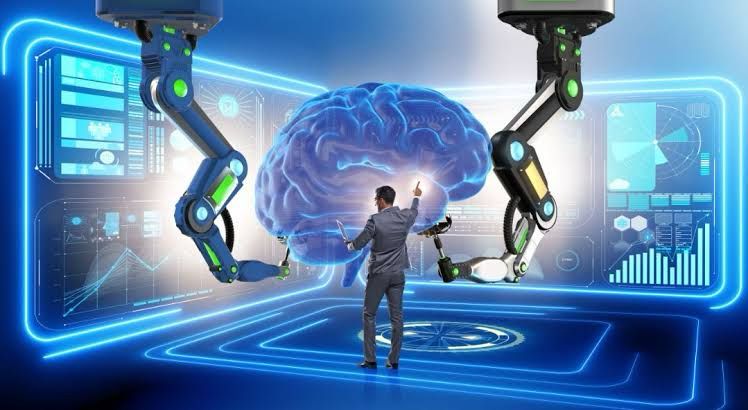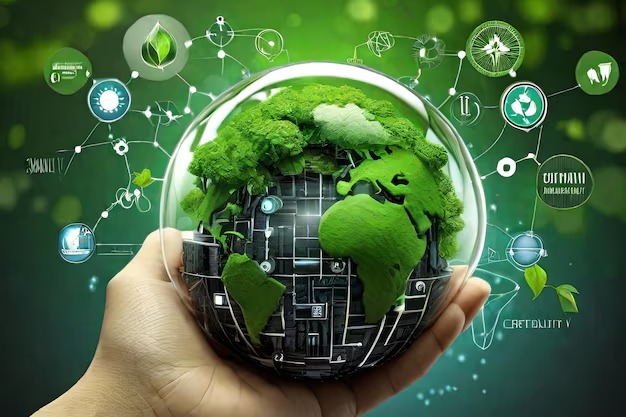
The Role of Artificial Intelligence in Everyday Life
Artificial Intelligence (AI) is deeply embedded in daily activities, enhancing convenience, efficiency, and personalization across various sectors such as healthcare, entertainment, transportation, and education. From voice assistants and smart homes to personalized recommendations and autonomous vehicles, AI shapes how we interact with technology, solve problems, and make decisions, revolutionizing our routines while raising important ethical considerations about privacy, job displacement.
✨ Raghav Jain

The Role of Artificial Intelligence in Everyday Life
Artificial Intelligence (AI) is no longer confined to the realm of science fiction or high-tech laboratories. Today, AI has seamlessly integrated into various facets of our daily lives, often in ways we may not even notice. From personalized recommendations on streaming services to smart assistants that schedule our meetings and control home appliances, AI is transforming how we live, work, and interact with the world. This article explores the multifaceted role AI plays in our everyday experiences, the technologies behind it, its impact, benefits, and potential concerns.
1. What Is Artificial Intelligence?
Artificial Intelligence refers to the simulation of human intelligence in machines that are programmed to think and learn. These machines are designed to mimic human cognitive functions such as problem-solving, learning, reasoning, perception, and language understanding.
AI is typically classified into three categories:
- Narrow AI: Designed for specific tasks (e.g., voice assistants, facial recognition).
- General AI: A theoretical form that can perform any intellectual task a human can.
- Superintelligent AI: Hypothetical AI that surpasses human intelligence.
Today’s AI is mostly "narrow AI," performing defined functions with remarkable precision.
2. AI in Personal Life
2.1 Smart Assistants
Devices like Amazon Alexa, Google Assistant, and Apple’s Siri use natural language processing (NLP) to understand and respond to user commands. Whether it’s playing music, setting reminders, or providing weather updates, these AI-powered tools enhance convenience.
2.2 Personalized Content and Recommendations
Streaming platforms like Netflix and Spotify use AI algorithms to analyze user behavior and preferences, offering tailored recommendations. Similarly, online retailers like Amazon suggest products based on previous purchases and browsing history.
2.3 Smart Homes
AI-driven smart home systems allow users to automate lighting, heating, security, and even grocery shopping. Smart thermostats learn from user habits to adjust temperatures efficiently, while AI-powered security cameras recognize familiar faces and alert users of suspicious activity.
2.4 Health and Fitness
AI integrates with wearable devices such as Fitbits and Apple Watches to monitor physical activity, heart rate, and sleep patterns. These insights help users improve their well-being and make informed health decisions.
3. AI in Communication and Social Media
Social media platforms employ AI to curate feeds, moderate content, and target advertisements. AI identifies trending topics, filters spam, and uses facial recognition for tagging photos.
3.1 Chatbots and Virtual Support
AI chatbots on websites and messaging platforms provide 24/7 customer service, handling routine inquiries and troubleshooting with human-like responses.
4. AI in Transportation
4.1 Navigation and Traffic Management
Applications like Google Maps and Waze use AI to analyze real-time traffic data, suggest optimal routes, and predict arrival times.
4.2 Autonomous Vehicles
Self-driving cars, developed by companies like Tesla and Waymo, rely on AI to process data from sensors, cameras, and GPS systems to make split-second decisions on the road.
4.3 Ride-Sharing Services
AI matches riders with drivers, determines optimal pickup routes, and dynamically adjusts pricing during peak hours.
5. AI in Healthcare
5.1 Diagnosis and Treatment
AI assists in diagnosing diseases such as cancer, diabetes, and neurological disorders through image recognition and data analysis. Tools like IBM Watson analyze patient records to recommend treatment options.
5.2 Drug Discovery
AI accelerates drug discovery by identifying potential compounds and predicting their effectiveness, drastically reducing research time and cost.
5.3 Virtual Health Assistants
AI-based virtual assistants help patients manage medications, schedule appointments, and provide symptom-based preliminary assessments.
6. AI in Education
AI transforms education through:
- Personalized Learning: Platforms adapt to individual student learning speeds and styles.
- Automated Grading: AI can grade assignments and provide feedback.
- Tutoring Systems: Virtual AI tutors help students with subjects ranging from mathematics to language learning.
7. AI in Business and Finance
7.1 Customer Relationship Management (CRM)
AI tools automate communication, analyze customer data, and enhance engagement strategies.
7.2 Financial Forecasting
Banks and financial institutions use AI to detect fraud, assess creditworthiness, and forecast market trends.
7.3 Automation and Robotics
Businesses automate repetitive tasks through AI-powered robotic process automation (RPA), improving efficiency and reducing human error.
8. AI in Entertainment and Gaming
AI creates immersive experiences in video games by enabling non-player characters (NPCs) to behave more realistically. In filmmaking, AI is used for scriptwriting, editing, and special effects.
9. Ethical and Social Implications
9.1 Job Displacement
As AI automates tasks, there's growing concern over job losses, particularly in manufacturing, transportation, and administrative roles.
9.2 Data Privacy
AI systems collect vast amounts of personal data, raising concerns about surveillance, consent, and misuse.
9.3 Bias and Discrimination
AI can inherit biases present in its training data, leading to unfair decisions, especially in hiring, law enforcement, and lending.
10. The Future of AI in Everyday Life
AI’s role will continue to grow with advancements in quantum computing, edge AI, and machine learning. Future applications may include:
- AI companions for the elderly and socially isolated.
- Augmented reality (AR) enhanced by AI for learning and entertainment.
- Predictive policing and public safety monitoring (though controversial).
- Hyper-personalized healthcare based on genetic data.
Artificial Intelligence (AI) has become an inseparable and transformative force in everyday life, fundamentally altering how we interact with technology, information, and one another in both subtle and overt ways, often without our conscious awareness. Once the subject of science fiction and academic speculation, AI is now a mainstream element integrated across countless industries, applications, and daily tasks, enabling efficiency, personalization, and convenience on an unprecedented scale. The most visible and accessible examples of AI can be found in consumer-facing technologies, such as smartphones, where digital assistants like Apple’s Siri, Amazon’s Alexa, and Google Assistant rely on natural language processing and machine learning to interpret voice commands, answer questions, schedule reminders, and control smart home devices—transforming the user experience through voice-activated convenience. These AI assistants demonstrate how natural language understanding and response generation have become so refined that machines can now simulate human-like interactions with impressive accuracy. Similarly, AI-driven recommendation engines on platforms like Netflix, YouTube, Amazon, and Spotify analyze vast amounts of user data, including viewing or browsing history, preferences, and behavior patterns, to offer highly personalized suggestions, thereby enhancing user satisfaction and engagement while subtly shaping our consumption habits. In the realm of smart homes, AI plays a pivotal role in automating and optimizing various household functions; smart thermostats like Nest learn from user behavior to regulate temperatures efficiently, while AI-powered security systems recognize familiar faces, detect anomalies, and alert homeowners of potential threats, thereby improving safety and reducing energy consumption. Beyond the home, AI has become a vital component of navigation and transportation through applications like Google Maps and Waze, which use real-time traffic data, historical movement patterns, and predictive modeling to suggest optimal routes, estimate arrival times, and reroute users in response to accidents or congestion, ultimately saving time and reducing stress. The rise of autonomous vehicles, such as those developed by Tesla and Waymo, represents another leap in AI’s role in everyday mobility, with these vehicles relying on a combination of sensors, cameras, and deep learning algorithms to perceive their surroundings, make driving decisions, and learn from each trip to improve performance—though still in development, their growing presence indicates a future where commuting could become safer and more efficient. Meanwhile, AI in healthcare is revolutionizing patient care, diagnostics, and treatment, with systems like IBM Watson analyzing vast datasets of medical literature, patient records, and clinical trials to assist doctors in identifying diseases and recommending personalized treatment plans more quickly and accurately than traditional methods allow; furthermore, wearable health devices like the Apple Watch or Fitbit use AI to monitor vital signs, detect irregularities such as atrial fibrillation, and provide users with actionable insights about their health, promoting proactive well-being and potentially saving lives. Education has also been significantly impacted by AI through personalized learning platforms like Khan Academy and Duolingo, which adapt in real-time to individual learning speeds, strengths, and weaknesses, thereby supporting differentiated instruction that caters to each student’s unique needs; automated grading systems, AI tutors, and intelligent feedback mechanisms further streamline the educational process for both teachers and learners. In the workplace, AI automates repetitive tasks and enhances productivity through robotic process automation (RPA), virtual assistants, and data analytics tools, enabling professionals to focus on more strategic and creative endeavors; businesses leverage AI in customer service via chatbots that handle inquiries with natural dialogue, while sales and marketing teams use predictive analytics to identify leads, forecast trends, and tailor campaigns. Financial institutions deploy AI to detect fraudulent activity in real-time, assess creditworthiness, and provide robo-advisors for investment decisions, thus improving operational efficiency and customer trust. In the entertainment industry, AI assists in generating music, editing films, creating realistic visual effects, and enhancing the behavior of non-player characters in video games, making digital content more immersive and dynamic. Social media platforms, too, rely heavily on AI to filter content, recommend connections, detect harmful or inappropriate posts, and curate user feeds to maximize engagement, though this also introduces challenges around echo chambers, misinformation, and algorithmic bias. While the benefits of AI are considerable, they are accompanied by ethical, social, and economic concerns that must be addressed thoughtfully; for instance, the automation of jobs in sectors like manufacturing, logistics, and customer support raises fears of unemployment and workforce displacement, prompting discussions about reskilling, universal basic income, and the future of work. Data privacy is another critical issue, as AI systems often depend on large datasets that include personal and sensitive information, thereby raising questions about consent, ownership, surveillance, and potential misuse by corporations or governments. Additionally, AI algorithms are only as unbiased as the data they are trained on, which means that discriminatory patterns in historical data can be perpetuated or even amplified, leading to unfair outcomes in areas like hiring, lending, and law enforcement; addressing such bias requires transparency, accountability, and inclusivity in AI development and governance. As AI technologies continue to evolve, emerging trends like edge computing, quantum AI, and explainable AI (XAI) aim to make systems faster, more accessible, and more understandable, further embedding AI into the infrastructure of society. Looking forward, the integration of AI into augmented reality (AR), virtual reality (VR), and the Internet of Things (IoT) promises to create even more interconnected and intelligent ecosystems, from smart cities that optimize traffic flow and energy use to AI-powered personal companions that offer emotional support and monitor mental health. Despite the challenges and uncertainties, one thing is clear: artificial intelligence is no longer an optional or distant technology—it is a fundamental and growing part of how we experience the world, and its influence will only deepen as innovation continues to accelerate. Therefore, understanding, embracing, and guiding the responsible use of AI is not just the task of technologists or policymakers but of all individuals and communities who stand to benefit or be affected by its applications in everyday life.
Artificial Intelligence (AI) is rapidly becoming a cornerstone of modern life, intertwining itself into virtually every aspect of daily existence, often in ways we scarcely notice, yet its influence is undeniable and growing. At its core, AI involves the development of computer systems capable of performing tasks that traditionally required human intelligence, such as learning, reasoning, problem-solving, and decision-making. Its most prominent applications have infiltrated multiple sectors, ranging from healthcare to entertainment, education to transportation, and finance to customer service, changing how we live, work, and engage with the world around us. One of the most immediate and pervasive examples of AI in daily life is through personal digital assistants like Amazon’s Alexa, Google Assistant, and Apple’s Siri, which have revolutionized how people interact with their devices. These AI-powered systems use natural language processing (NLP) to understand voice commands, enabling users to effortlessly manage tasks such as setting reminders, controlling smart home devices, checking the weather, or even ordering groceries. This integration of AI has fundamentally altered the user experience by offering a seamless and intuitive interface, where users can simply speak their needs and have their commands executed in real-time, all without needing to physically interact with the device. In a similar vein, AI-driven recommendation engines are reshaping the way we consume digital content. On platforms like Netflix, Spotify, and YouTube, AI analyzes vast amounts of data regarding our viewing and listening habits, personal preferences, and interaction history to offer highly customized suggestions, making it easier for us to discover new shows, songs, or videos that align with our tastes. This constant stream of personalized recommendations has not only changed the entertainment landscape but also affected consumer behavior by influencing purchasing decisions through tailored advertisements on social media platforms like Facebook and Instagram, which use AI to target specific demographics based on user data. In the realm of transportation, AI has made significant strides with applications such as GPS navigation systems, which utilize real-time traffic data and machine learning to optimize routes, provide timely traffic alerts, and predict the fastest path to a destination. Apps like Google Maps and Waze are constantly learning from users' experiences, adjusting routes to account for new information like traffic congestion, accidents, or road closures, thereby improving efficiency and reducing travel time for millions of commuters daily. Beyond navigation, autonomous vehicles represent one of the most ambitious implementations of AI, as companies like Tesla, Waymo, and Uber develop self-driving cars capable of interpreting the environment, making decisions, and navigating roadways without human intervention. These vehicles rely on a combination of sensors, cameras, and sophisticated algorithms to process data in real-time, ensuring safety, efficiency, and precision in complex driving environments. The integration of AI into healthcare is perhaps one of the most transformative aspects of its impact on everyday life. AI systems can analyze medical data, such as patient records, imaging scans, and genetic information, to assist healthcare professionals in diagnosing diseases with greater accuracy and speed. Tools like IBM Watson Health have demonstrated AI’s potential in analyzing vast amounts of unstructured data, helping to identify potential health risks, suggest treatment options, and even predict patient outcomes. Additionally, AI is revolutionizing drug discovery by analyzing molecular structures and identifying potential compounds that could lead to the development of new medications. AI’s ability to process and interpret medical data has also extended to wearable devices such as fitness trackers and smartwatches, which use AI to monitor users’ health metrics, such as heart rate, sleep patterns, and physical activity, providing actionable insights that help individuals make healthier lifestyle choices. Education is another sector being reshaped by AI. AI-powered platforms like Khan Academy and Duolingo are enhancing the learning experience by offering personalized education that adapts to the learner’s pace, style, and preferences. These platforms use machine learning algorithms to identify areas where students are struggling and adjust content accordingly, offering tailored exercises, quizzes, and feedback. This level of personalized learning is particularly beneficial for students who may require additional support, as AI can provide real-time assistance without the constraints of traditional classroom settings. Furthermore, AI is being used to automate administrative tasks within educational institutions, such as grading, scheduling, and resource allocation, freeing up educators to focus on teaching and student engagement. In the workplace, AI’s influence is seen in its ability to automate routine and repetitive tasks, enabling workers to focus on more strategic, creative, and complex challenges. In fields like customer service, AI chatbots have become a common tool for handling inquiries, troubleshooting, and providing support, often offering instant responses to a wide range of queries. In industries such as banking and finance, AI algorithms are employed to detect fraud, assess risk, and manage investment portfolios. Robo-advisors, powered by machine learning, help individuals make data-driven financial decisions, optimizing their investment strategies based on personalized financial goals. Similarly, AI-driven analytics tools enable businesses to make more informed decisions by processing large volumes of data to identify trends, predict customer behavior, and optimize marketing efforts. Despite these advancements, AI also raises important ethical and societal concerns, particularly in areas like privacy, bias, and employment. AI systems often rely on vast amounts of personal data to function effectively, which has sparked debates about data privacy, surveillance, and the potential for misuse. As AI algorithms become increasingly capable of making decisions that affect people’s lives, from hiring practices to law enforcement, there is a growing concern about algorithmic bias—where the data used to train these systems may reflect existing societal inequalities, leading to discriminatory outcomes. Moreover, the automation of jobs in fields such as manufacturing, retail, and logistics has raised questions about the future of work, with many fearing that AI will displace human workers, particularly in low-skill, repetitive roles. To mitigate these challenges, policymakers, businesses, and technologists are working together to develop frameworks for ethical AI usage, ensuring transparency, fairness, and accountability in AI systems. Looking to the future, the role of AI in everyday life is only expected to grow, with emerging technologies such as machine learning, deep learning, and quantum computing unlocking new possibilities for innovation. AI-powered virtual assistants may become even more integrated into daily routines, anticipating our needs and offering proactive solutions to complex tasks. Furthermore, AI could play a key role in solving global challenges, from climate change to healthcare, by analyzing data at unprecedented speeds and scale, offering insights and solutions that were previously unimaginable. Ultimately, AI is not just a tool but a transformative force that is reshaping society, prompting us to rethink how we live, work, and interact with the world around us. As we move forward, it will be crucial to balance the benefits of AI with the potential risks, ensuring that it is developed and implemented in ways that are ethical, transparent, and beneficial for all.
Conclusion
Artificial Intelligence has already become a foundational component of modern life. From making our homes smarter to revolutionizing healthcare and transportation, AI improves efficiency, convenience, and safety. It plays a crucial role in streamlining daily tasks, enhancing personalized experiences, and supporting critical decision-making in various industries.
However, this technological marvel comes with challenges—ethical dilemmas, privacy concerns, and potential job displacement. To ensure a balanced integration of AI into society, we must prioritize transparency, accountability, and fairness in AI development and deployment.
In conclusion, the impact of AI on everyday life is profound and inevitable. As AI continues to evolve, embracing it responsibly will be key to reaping its benefits while mitigating its risks.
Q&A Section
Q1: What is Artificial Intelligence in simple terms?
Ans: Artificial Intelligence is the ability of machines or software to perform tasks that typically require human intelligence, such as understanding language, recognizing images, making decisions, or solving problems.
Q2: How does AI affect our daily lives?
Ans: AI impacts our lives by powering virtual assistants, recommending content, optimizing travel routes, managing smart homes, and even assisting in medical diagnoses.
Q3: Are AI and machine learning the same?
Ans: No, AI is a broader concept of machines being intelligent, while machine learning is a subset of AI that enables machines to learn from data and improve over time without explicit programming.
Q4: Is AI safe to use in everyday applications?
Ans: Generally, AI is safe in controlled and well-designed systems; however, there are concerns regarding data privacy, bias, and unintended consequences that require ongoing monitoring and ethical oversight.
Q5: Will AI take over human jobs?
Ans: AI is likely to automate many repetitive and routine tasks, which could displace some jobs. However, it will also create new roles requiring human creativity, empathy, and oversight.
Similar Articles
Find more relatable content in similar Articles

Protecting Kids in the Digital..
In an increasingly connected w.. Read More

Data Centers and the Planet: M..
As cloud computing becomes the.. Read More

Digital DNA: The Ethics of Gen..
Digital DNA—the digitization a.. Read More

Wearable Health Sensors: The D..
Wearable health sensors are re.. Read More
Explore Other Categories
Explore many different categories of articles ranging from Gadgets to Security
Smart Devices, Gear & Innovations
Discover in-depth reviews, hands-on experiences, and expert insights on the newest gadgets—from smartphones to smartwatches, headphones, wearables, and everything in between. Stay ahead with the latest in tech gear
Apps That Power Your World
Explore essential mobile and desktop applications across all platforms. From productivity boosters to creative tools, we cover updates, recommendations, and how-tos to make your digital life easier and more efficient.
Tomorrow's Technology, Today's Insights
Dive into the world of emerging technologies, AI breakthroughs, space tech, robotics, and innovations shaping the future. Stay informed on what's next in the evolution of science and technology.
Protecting You in a Digital Age
Learn how to secure your data, protect your privacy, and understand the latest in online threats. We break down complex cybersecurity topics into practical advice for everyday users and professionals alike.
© 2025 Copyrights by rTechnology. All Rights Reserved.